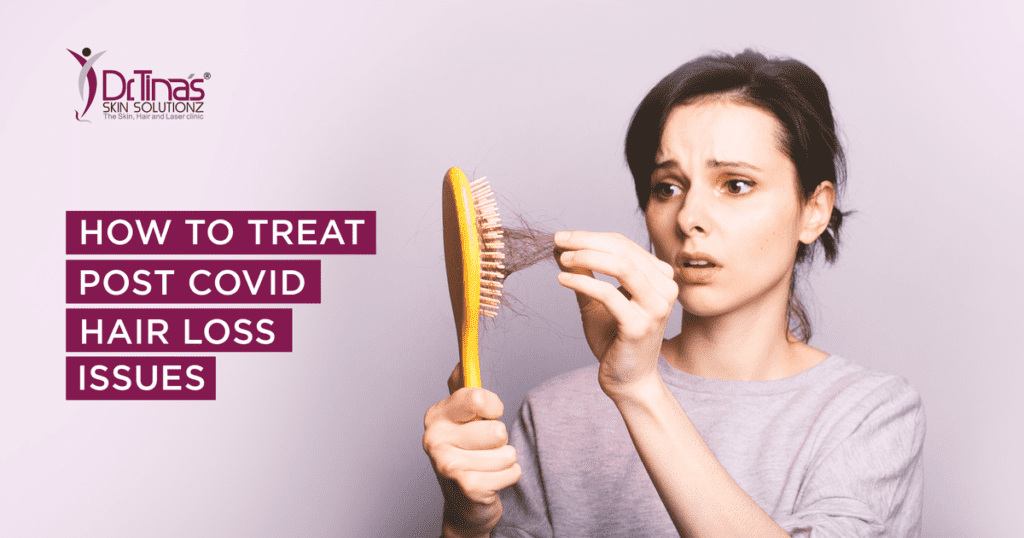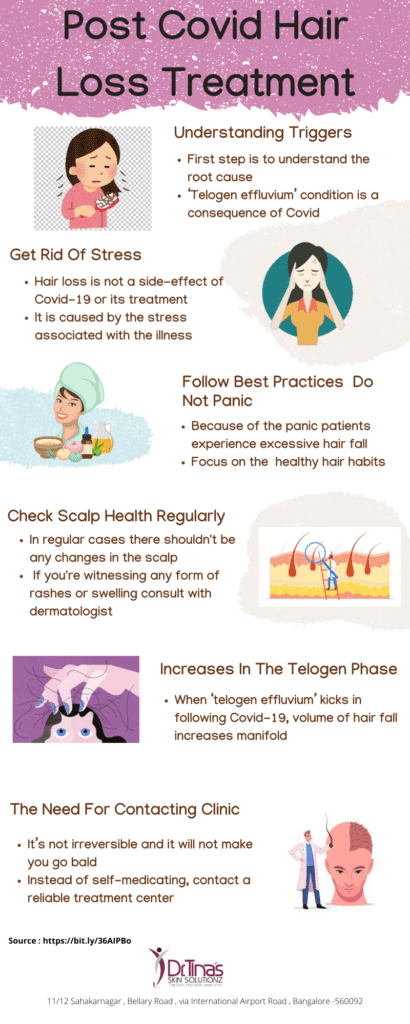How to Treat Post Covid Hair Loss Issues?
You’ve recovered from COVID and you're feeling great! Two or three months have passed, and life seems back to normal. But then you notice more hair falling out during your daily routine. At first, you assume it's just temporary and decide to monitor it. However, the situation worsens—your hair starts falling out in clumps, and even your housekeeper mentions it. Does this sound familiar? Post-COVID hair loss (which can range from moderate to severe) has become increasingly common—nearly 90% of these cases involve the condition known as telogen effluvium. This condition is triggered by extreme emotional or physical stress. The good news is that post-COVID hair loss is non-scarring and reversible. Instead of worrying excessively, consider reaching out to a reputable dermatology clinic for hair loss treatment in Bangalore. They can provide tailored solutions to help you address the issue effectively. Here’s what you need to know about managing post-COVID hair loss: The first step toward addressing post-COVID hair loss is gaining a clear understanding of its underlying triggers. The telogen effluvium condition disrupts the natural hair growth cycle, often due to factors such as fever, infections, emotional or physical stress, dietary changes, or rapid weight loss. If the hair loss isn't linked to nutritional deficiencies or medication side effects, it usually resolves on its own within 7-9 months. However, seeking professional guidance can accelerate recovery. It’s important to recognize that telogen effluvium isn’t a direct symptom of COVID-19 but rather a delayed response to the stress caused by the illness. Specialists note that there’s typically a 2-3 month lag between the onset of a stressful event (like a COVID infection) and noticeable hair shedding. If you’re losing more than ~100 hairs daily, especially in clumps, it’s wise to consult a dermatologist promptly. Since the pandemic began, the incidence of telogen effluvium has surged by almost 400%. While the phenomenon isn’t directly caused by COVID-19 or its treatment, it’s largely driven by the stress associated with the illness. Managing stress is therefore critical to addressing post-COVID hair loss. Self-care practices such as setting aside personal time for relaxation, engaging in regular exercise and meditation, ensuring adequate sleep, and maintaining positive relationships can significantly reduce overall stress levels. Consulting a licensed therapist may also offer valuable insights into effective stress management techniques. Experts from top clinics specializing in hair loss treatment in Bangalore emphasize that post-COVID hair loss is a temporary condition that resolves naturally. However, panic often leads individuals to rush into unnecessary treatments without addressing lifestyle factors or underlying medical concerns. Focus on adopting healthy hair care habits. While it’s unsettling to see hair fall out in clumps after washing, remember that post-COVID hair loss won’t cause baldness—a common misconception. Using the right conditioning products or oils to protect your hair from UV damage is beneficial. Heat-based treatments should be avoided, and tight hairstyles like braids or ponytails should be minimized, as recommended by your doctor. Stick to your usual hair care routines, including washing and styling. Fear of washing your hair because of visible hair loss shouldn’t deter you from cleansing—it takes time, but the condition will gradually improve. In typical cases of telogen effluvium, there’s little to no change in the appearance of your scalp. However, if you notice rashes, swelling, or experience burning, itching, or pain, it’s crucial to contact a reliable hair loss treatment clinic immediately. Maintaining proper scalp hygiene and adopting healthy hair care practices can help mitigate the effects of telogen effluvium. Interestingly, the telogen effluvium phenomenon isn’t exclusive to COVID-19 patients. The pandemic has introduced various stressors, such as anxiety about the virus, social isolation, and financial pressures. Everyone should prioritize stress reduction and adopt good hair and scalp care habits. Although these times are challenging, don’t let them overwhelm you. Eating a balanced diet is essential for recovering from post-COVID hair loss. Your healthcare provider or dietician may recommend a diet rich in iron, vitamins (such as B12, C, and D), zinc, folic acid, and protein. In some cases, supplements or medications might be prescribed. Avoid taking over-the-counter drugs indiscriminately, as they could have unintended consequences. Additionally, your genetic predisposition plays a role in how quickly and effectively the telogen effluvium condition reverses. Individuals with higher iron levels tend to recover faster than those with anemia. Clump-like hair loss can sometimes result from alopecia areata or other autoimmune disorders, but there’s no definitive link between these conditions and COVID-19. Hair follicles normally follow a three-phase growth cycle: anagen (growth), catagen (resting), and telogen (shedding). Following a bout of COVID-19, the telogen phase increases by nearly 50%, causing significant hair shedding. Adopting healthy dietary and lifestyle habits, along with guidance from a dermatologist, can help restore balance to the hair growth cycle. Monitoring your hair loss over time can also help track progress. Recovery doesn’t happen overnight, so patience is key. Recommended Reading: Why PRP Treatment Works Well for Hair Loss While post-COVID hair loss is non-permanent and unlikely to cause complete baldness, ignoring the issue can lead to serious consequences. Instead of self-medicating, it’s best to consult a trustworthy skin and hair loss treatment center, particularly if the hair loss persists for an extended period. A qualified dermatologist can provide personalized dietary and lifestyle recommendations, as well as prescribe supplements when needed, to expedite the healing process. Seeing large amounts of hair fall out after every wash can be distressing, but if it’s due to telogen effluvium, the problem is definitely manageable. Reach out to a reputable hair treatment clinic in your area as soon as possible. For instance, if you live in Bangalore, finding reliable centers for post-COVID hair loss treatment is straightforward. Dr. Tina Ramachander is one of the best dermatologists in Bangalore and the Medical Director at Dr. Tina’s Skin Solutionz, a skin care clinic in Bangalore. She holds a master’s degree in dermatology from the prestigious JJM Medical College in Karnataka and currently practices as a dermatosurgeon and Medical Cosmetologist in Bangalore. Buckwheat Cold Noodles,Handmade Buckwheat Cold Noodles,Cold Soba Noodle,Cold Soba Noodles With Cucumber YANBIAN ALALI FOOD CO. LTD , https://www.alalinoodles.comHow to Address Post-COVID Hair Loss Challenges?

Understanding the Root Causes
Stress Management Is Key
Follow Healthy Hair Care Practices
Monitor Your Scalp Health
The Role of Nutrition in Accelerating Hair Regrowth
Telogen Effluvium and Increased Hair Shedding After COVID
When to Seek Professional Help

